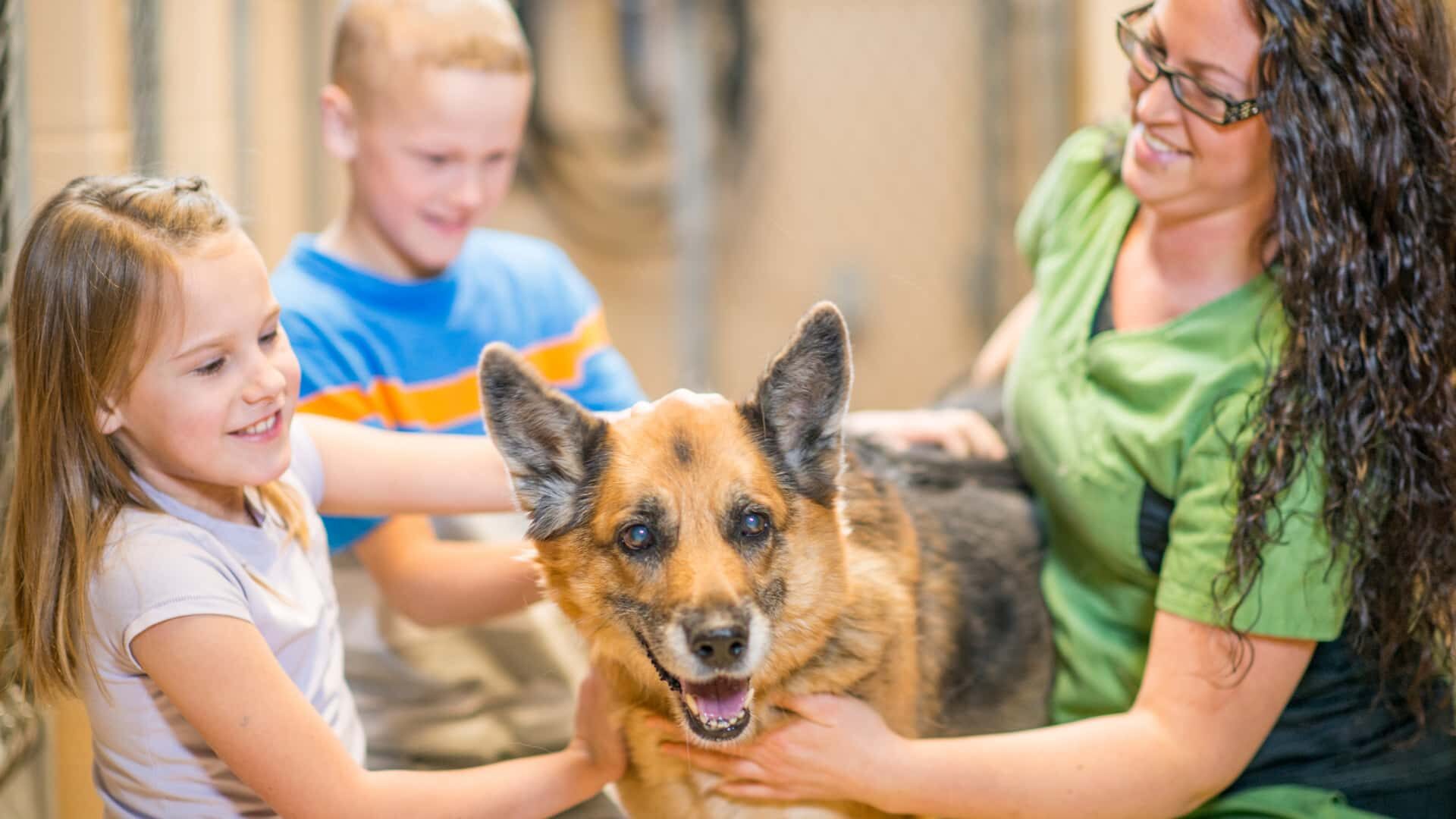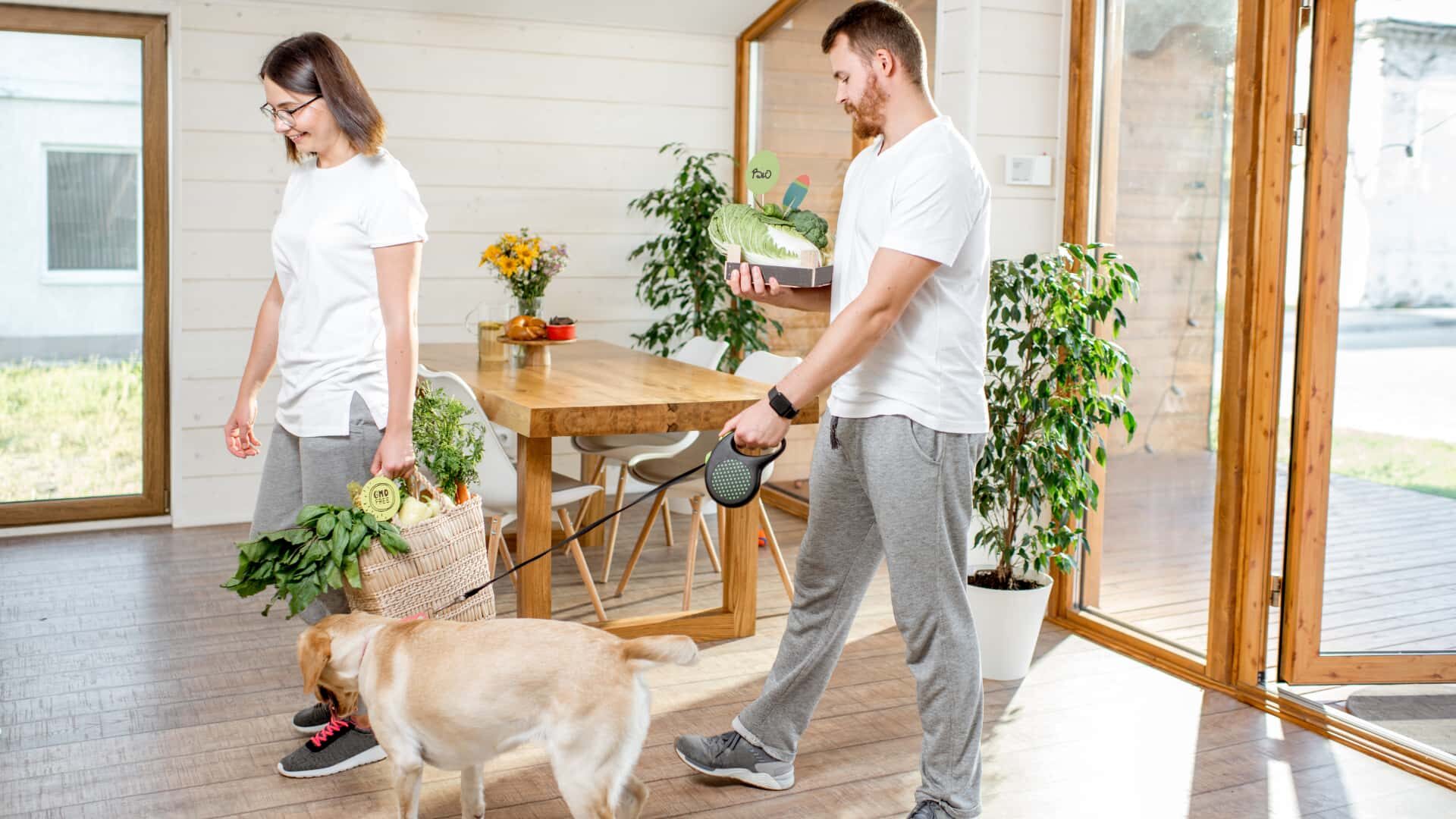You’ve decided you want to become a dog owner. Great! Now you need to find a great dog and pick one of these breeds that have high intelligence and are considered easy to train. But don’t just grab the first dog you see. You’ll want to ask these questions first to make sure it’s the right fit for your family.
Adopting a dog without knowing anything about his past might be a stressful experience, am I right? Does he have any behavioral challenges or health concerns? And where did he come from?

So I’ve put together some questions to ask a rescue or humane society about the dog you’re interested in adopting. Think of it as a set of questions to ask when applying for dog adoption.
What’s the point of asking questions before bringing a new pet into your home?
In the eyes of many pet owners, “Don’t shop, adopt” is the best advice. However, before taking a dog home from the shelter, it’s vital to do extensive research. Shelter dogs, unlike pups from a reputable breeder, may have a lengthy and often traumatic past.
Knowing precisely what you’re getting yourself into is essential whether you’re adopting an older dog from the pound or a younger one from an animal shelter.
Dogs have varying amounts of knowledge, and these 25 questions are an excellent place to start. Until a dog has been put in a household setting, it may not be possible to fully evaluate the dog’s suitability for adoption.
A dog that has been fostered is an ideal candidate for adoption. Being able to spend quality time with the dog, they have a wealth of knowledge about his character features and peculiarities to share with you.
Adopting a dog is not something you should ever feel pressured to do. For your family’s sake, you want to make sure he’s a good match. Even with a senior dog, the time and money commitment are significant.
When you’re considering adopting a dog, it’s important to ask questions and make sure that you are prepared for the commitment. Here are most primary questions to ask.
1. Why do you want a dog ?
Do you want a dog because you think it’s time for one? Are you looking for companionship and love? Does your family have the time and energy to care for an animal? In order to be really honest, you need to ask yourself why you really want a dog.
2. What type of dog do you want?
Shelters and rescues have so many different dog breeds and mixes to choose from that it may be difficult to choose the appropriate dog for your family. It’s important to think about what kind of energy level and personality will fit into your lifestyle, as well as what type of features or characteristics appeal to you most.
If possible, visit local shelters so that you can interact with some dogs before deciding which type is best suited for your home.
3. The dog needs constant training, so are they prepared to do so?
Puppies and young dogs are perfect for families with children under the age of 10. When it comes to training, younger dogs are more adaptable, whereas older dogs tend to be more resistant to change.
4. Does every family member want a dog?
Consider fostering rather than adopting if just one member of your family is willing to take on the responsibility. Fostering gives families the chance to experience owning a dog without committing to the long-term responsibilities involved with pet ownership.
5. Is your budget ready for a dog?
A healthy dog can cost up to $1,000 per year in food, veterinary care, toys, and other expenses.
A puppy can cost anywhere from $300-$1000, depending on its age, size, and breed. You should expect to pay about $100-$300 for neutering or spaying your pet if you choose that option for them (which is highly recommended).
25 questions and answers to ask yourself before adopting a dog
Are you considering adopting a dog but feeling overwhelmed by all the information out there? Not quite sure which specific breed to adopt or if you’re ready for the responsibility of dog ownership? Before I adopted my first dog, I felt the same. You may use these 25 questions and answers to help you determine whether a dog is a good fit for your lifestyle.

1. The dog’s origins are a mystery.
Each dog’s unique narrative might help you better understand the obstacles you may encounter in rescuing a dog from a shelter or shelter. To illustrate this point, consider the difference between dogs who are found as strays and those that are surrendered by their owners and have previously received obedience training.
Find out as much as you can about the dog’s past. They’ve been in the shelter or rescue facility for how long now. What was the reason for their capitulation? Is there a history of abuse with this person?
Is there such a thing as a right or wrong answer? It all comes down to your prior dog-training expertise and your willingness to put in the time and effort necessary to properly teach your new canine partner.
2. How many homes have this dog previously had?
It’s heartbreaking to learn that some pets have a history of being rehomed. You must have faith in your capacity to cope with behavioral issues. However, dogs may end up in a number of different homes through no fault of their own.
For example, a dog that is too rambunctious for certain families may be perfect for you. Regardless of the cause, a dog who has moved around a lot may need extra time and patience to settle in.
3. Lastly, how well is the dog doing physically and mentally?
Finding out how much veterinary care the dog has had while at the shelter or rescue is essential. For example, are the dog’s vaccines current, and has the dog been spayed or neutered? Request a copy of the files.
You want to know what type of care you’ll have to supply at the beginning of your relationship. However, keep a long-term perspective in mind as well. Inquire about any preexisting medical issues.
The dog’s ability to engage in some activities may be limited as a result of the increased expense of care. Your new rescue, on the other hand, will return you a hundredfold in affection.
4. Is it a purebred or a mix of breeds?
You may find several purebred dog rescues if you are seeking a certain breed. Even yet, it’s possible that a dog of a mixed breed to be a good friend. Knowing the dog’s breed or a probable mix of breeds might help you better understand the dog’s nature and anticipate its demands.
The intelligence of a Border Collie is undeniable, but so is the necessity to keep him busy and stimulated psychologically. Your next Flyball partner may not be a Chihuahua. A more accurate evaluation of your appropriateness may be made if you are aware of what to anticipate in terms of energy levels and activity requirements.
5. How would you describe the dog’s temperament?
Find out what a dog’s preferences and dislikes are from the workers at a shelter or rescue facility. Is a ball in their mouth the best way to make them happy? They seem to be driven by a need for food.
Which is more important to them: time spent by themselves or time spent with other people? Be mindful that a dog’s disposition will be better understood if they have lived in a foster home rather than a shelter.
6. How well-behaved is the dog?
However, if your dog isn’t already housebroken, you’ll need to be ready to put in the time and effort necessary to train him. Just because a dog is an adult doesn’t mean they’re already trained.
Some dogs were never taught how to go to the bathroom in the appropriate manner. Even a senior dog may be potty trained with the correct potty training method.
7. What is the temperament of this dog when it comes to youngsters and strangers?
Most dogs can be with humans of any age or look if they’ve been socialized appropriately. The socialization that many rescue dogs lack because they were abandoned as pups are what causes them to be afraid or uncomfortable around children or strangers.
With children in your life, a dog with these difficulties is most certainly not the best option. A nervous dog may be transformed into a dog that is comfortable with everyone if you have the time and skill to work with it.
8. Is this dog good with other animals, such as cats or other dogs?
Again, a dog’s inability to interact with other animals might be attributed to a lack of socialization. If you live in the country, this may not be a problem.
As long as your new dog isn’t apprehensive or worried while strolling in a neighborhood with other dogs, you should be OK. Does your dog have the stamina for counterconditioning and desensitization? Is your new puppy going to blend in with the rest of your pets?
9. Is the dog obedient and polite?
Obedience superstars are rare, but dogs at shelters and rescues may range from well-trained to completely untrained. Make sure you know what the dog can do, such as sit or stay, by asking the rescue or shelter workers.
For a more seamless transition, utilize the vocal and physical signs that your dog already understands. Inquire about the dog’s ability to walk on a leash. Most dogs have difficulty with walking on a loose leash, so you want to know how much training your dog will need to master this skill. Before you make a choice, see if you can take your dog for a few walks.
10. Are there any behavioral issues with the dog?
Ask if there are any behavioral issues. As easy as leaping on someone or as serious as protecting valuable resources, Depending on the circumstances, this might be accomplished in a variety of ways.
Ask if there are any signs that the dog is afraid of being left alone. Ask whether the dog has ever bitten someone or anything. The vast majority of behavioral issues can be remedied, but others will never completely go. It’s possible that owning a dog with difficulties might be too much for you.
11. If the rescue doesn’t work out, will the shelter or rescue take the dog back?
Although the objective is to find a permanent home for the dog, rescues don’t always work out. Or it may not get along with your current pet.
Regardless of the circumstances, the dog should be handed up to a respectable rescue organization at any time. If you have any reservations, this rescue opportunity may not be for you. Be aware that there are many shelters and rescues out there.

12. How did the dog come to be in the foster home or shelter?
The dog may have been found by someone who took him in, or he may have been surrendered by his owner. In some situations, people will take in a stray dog and not be able to keep him for whatever reason.
This is a difficult question to ask when you are dealing with a rescue organization, but if you are considering adopting from a foster home, this is important information to gather.
13. How long has he been there?
If you are looking at an animal from a shelter or rescue organization, then this is something that you should know before making your decision. If the dog has been there for a long time (more than three months), then it’s likely that other people were interested in adopting him before you came along.
You may also want to consider whether his time there was due to his behavior issues or other medical problems that make him difficult for adopters to handle.
14. Why was the dog surrendered?
If the owner gave up their pet because they moved and did not have room for him anymore, then this might not be a good fit for you since you have no plans of moving anytime soon.
15. Is he a good dog for going on hikes or running?
Yes! He sounds like an excellent running companion, especially if you have another runner that would like some company. Make sure to carry water and food for both of you if you plan to go for a long run with him. A lot of effort goes into running.
16. Is the dog crate trained?
Yes! That is great news! He sounds like a well-behaved pup who would be happy in a crate when left home alone. It’s best to crate train all dogs from a young age, so they become accustomed to being in one spot for short periods of time. They will feel more secure and less stressed out if they know they have a safe place to retreat to when they need it (just like humans).
17. Do I have the time to care for a dog?
Adopting a dog is a big commitment. Dogs need one-on-one attention and exercise, and they’re happiest when they spend time with their people. Avoid getting a dog if you don’t have time for walks, plays, and spending quality time with your pet.
18. Can I afford a dog?
Dogs need high-quality food, treats, toys, and regular veterinary care — all of which add up quickly. If you can’t pay for these expenses, do not get a dog until you can afford them. If you have financial problems, consider getting a less expensive breed of dog or adopting an older pet (you’ll save yourself some money!).
19. Am I prepared for the responsibility that comes with adopting an animal?
The truth is that dogs aren’t like other pets: They are living beings who require attention and care every day of their lives — not just when it’s convenient for their owners! Adopting an animal means making sure it has everything it needs to be happy and healthy — including food, water, shelter from the elements (if necessary), exercise opportunities, and plenty of human contacts (especially during the first year).
20. What kind of dog would be best for my family?
If you have children, consider adopting from a breed known to be good with kids. Make sure your other pets can get along with dogs if you have them in the house.
21. Do I have enough money?
Adopting can cost anywhere from $50 to $500 or more, depending on the age and breed of the dog being adopted. For the first year or two, you’ll have to pay for immunizations, veterinary care, and other expenses. Spaying/neutering, heartworm prevention, and routine medical care that comes with owning a pet.
22. Are there any other pets in your household (cats, birds, ferrets)?
What kind of relationship did they have with each other before they met the new dog, and what will be different now that they share their home with one another?
23. How long has it been since you last had a dog in your home?
Remember life before the puppy or kitten came into your life? I bet you do. Feeding him twice a day, playing with him, and making sure he receives enough exercise and mental stimulation each day to ensure that he is healthy and happy for years to come.
24. Can I afford to feed and house the animal?
There are many wonderful rescue groups that provide food and veterinary care for their animals. But if you’re buying from a breeder (or even adopting from a private owner), you’ll need financial resources beyond those provided by your local shelter.
25. Do I have enough space for my new pet?
Space isn’t just about having room for exercise – it’s also about giving your dog its own safe place to sleep, eat and play when you’re not home (or asleep). A large fenced yard is ideal for most breeds, but even apartment dwellers can give.
Watch Things you must know before adopting a dog | Video
Conclusion
If you’re thinking of getting a dog, we hope this information is helpful. We believe dog ownership to be one of the greatest expressions of love and commitment a person can make. But adopting a new pet is an important decision, and it’s one that shouldn’t be taken lightly. Before you adopt, ask yourself how ready you are for the commitment.
Don’t forget that these questions aren’t meant to help you choose a great dog. They’re there to help you discover the ideal canine companion. It is possible, for example, to help a dog with behavioral problems grow up to be a loyal and loving friend.
Bottom up
Please comment below about your ideas and share this “25 MUST Questions to Ask When Adopting a Dog: Guide” article with your friends.
Stay tuned with our website to find out more exciting stuff. Don’t forget to check out our previous articles too.
Until the, Read about, Why Does My Dog Rubbing Its Face After Eating: 10 Reasons





